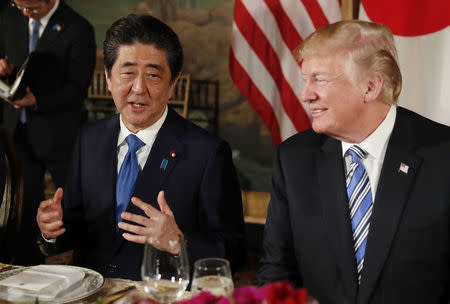Japan's Abe, Trump agree Korean summit positive for denuclearisation - PM's office

By Thomas Wilson
TOKYO (Reuters) - Japanese Prime Minister Shinzo Abe and U.S. President Donald Trump welcomed the inter-Korean summit as good for denuclearisation and a "historical step" towards peace and stability in northeast Asia, Abe's office said on Sunday.
The leaders of North and South Korea pledged at a historic summit on Friday to work for "complete denuclearisation" of the Korean peninsula. However, Trump said he would maintain pressure on Pyongyang through sanctions ahead of his own unprecedented meeting with North Korean leader Kim Jong Un.
Abe and Trump spoke on a 30-minute phone call on Saturday, in which they agreed on how crucial it was that Pyongyang take concrete steps towards denuclearisation, the Japanese premier's office said in a statement.
"The important thing is whether North Korea will take specific actions in the future," Abe told reporters late on Saturday, according to remarks released by his office.
Trump and his South Korean counterpart, Moon Jae-in, agreed on the need for an early summit between Trump and North Korean leader Kim Jong Un, which Trump has said would take place in the next three to four weeks.
Separately, Abe told reporters after a call on Sunday with Moon that the South Korean president had raised at the summit with Kim the issue of past abductions of Japanese citizens by North Korea. It has been one of the thorniest issues in relations between the two countries.
North Korea admitted in 2002 to kidnapping 13 Japanese in the 1970s and 1980s to train spies. Five of them returned to Japan, but Tokyo suspects that hundreds more may have been taken.
Abe has made the abductions a keystone of his political career, and has pledged to work until all 13 of the people North Korea admitted to abducting have returned to Japan.
(Reporting by Thomas Wilson; Editing by Gerry Doyle)

